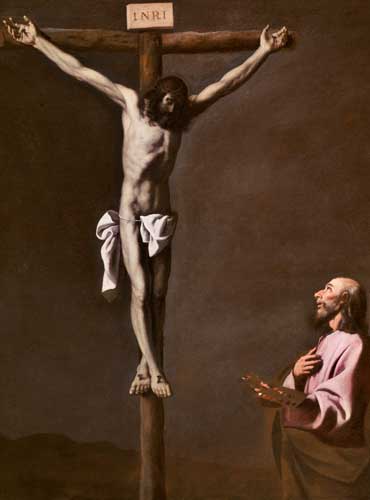Friday of the Fifth Week of Easter – Jn 15:12-17
Today’s Gospel continues the Last Supper discourse, and both at the beginning and the end of the passage Christ tells His disciples that “His commandment,” the one thing that they must do, is love one another. There are two passages that warrant some consideration, and that we can apply to our lives: first, the words “No one has greater love than this, to lay down one’s life for one’s friends,” and, second, the phrase “I no longer call you slaves, because a slave does not know what his master is doing. I have called you friends.” So, the greatest love, and the reference to slaves and friends.
Regarding the first, it’s really hard to capture the beauty and power of Christ’s words. There’s two subtle details that get passed over in translation. First, stuck in between the phrase, “No one has greater love than this,” and the other phrase, “to lay down one’s life for one’s friends,” the Greek has a tiny conjunction, ἵνα, that connects them but that doesn’t get translated. It means intent, or the ordering, or the reason for something, the why behind it. If we tried to translate it, the phrase would be something like: “No one has greater love than this [love], which was, from the beginning, as it was originally conceived by God, meant and designed to reach even to the extreme of sacrificing one’s life.”[1] God’s plan, God’s design, was that the greatest love of all would be sacrificial, and not just sacrificing little things here or there, but was really matters. We know this, secondly, from the order of the Greek words, which throws the emphasis on life: the love is proven because of how unique and unrepeatable the thing sacrificed is.[2] Money can belong to anyone, material goods are free for the taking, but someone’s life is the most precious and personal thing they have. Such was the love with which God loved us from all eternity, and such is the love that we are called to have with our brothers and sisters. Of course, loving one permits us to love God, since, as tells us Saint John in his first letter: “whoever does not love a brother whom he has seen cannot love God whom he has not seen” (1 Jn 4:20). If we’re really willing to lay down our lives for our brothers and sisters, then we will also be able to lay them down for God. In our daily lives, we can’t fool ourselves into thinking that we will do great things for God, or that we will give our lives to Him in our missions if, here and now, I can’t sacrifice even the smallest things, especially my time and things that require charity towards my fellow religious. Yet, that’s the love that we’re called to practice.
Second, Christ tells His disciples that He doesn’t call them “slaves,” but friends. This would have been surprising to His listeners, since the term δούλους, or slave or servant of God, didn’t have a pejorative meaning in the Biblical times. In fact, great men like Moses (Dt 34:5), Joshua (Jos 24:29), and David (Ps 89:20) were all called slaves of God. “The greatest men in the past had been proud to be called slaves of God,” but “Christ offers an intimacy with God which not even the greatest men knew before he came into the world.”[3] The term friends of God also has a context. Abraham was called the friend of God, but there was also a custom that the Roman emperors and eastern kings would have a very select group of men called “The Friends of the King.” “At all times they had access to the king: they had even the right to come to his bedchamber at the beginning of the day. He talked to them before he talked to his generals, his rulers, and his statesmen. The friends of the king were those who had the closest and the most intimate connection with him.”[4]
As Catholics, but particularly as religious, Christ calls us to be His friends, to be the ones closest to Him. We can forget this, but we shouldn’t. We are the ones who have access to Him, day and night, to ask for His grace and help. We can ask ourselves: do we think of ourselves as Christ’s friends? Do we realize that our friendship means sacrifice and death?
Let us ask, through the intercession of Mary, Mother of God, for the grace to lay down our lives of our love for Christ, and so be worthy of the name of friend.
[1] Cf. Vincent’s Word Studies: “Hence that, as representing ἵνα, is to be taken in the sense of to the end or intent that; in order that. Here the use of the word is very subtle and suggestive, as well as beautiful. No man hath greater love than this (love), which, in its original conception, was intended and designed to reach to the extent of sacrificing life for a friend. Christ, therefore, here gives us more than a mere abstract comparison and more than a merely human gauge of love. He measures love according to its divine, original, far-reaching intent.”
[2] Cf. Cambridge Bible for Schools and Colleges: “The order of the Greek words throws the emphasis on ‘life:’ it is the unique character of the thing sacrificed that proves the love.”
[3] William Barclay’s Daily Study Bible
[4] Ibid.






